You'll boost your immune system and enjoy a delicious, vitamin-rich beverage with this easy-to-make Vitamin C tea blend. Start by mixing dried rosehips, hibiscus flowers, orange peel, elderberries, and ginger root. Measure 1-2 teaspoons of the blend per cup of water. Heat water to just below boiling, steep for 5-7 minutes, and add honey or lemon to taste. This antioxidant-packed tea supports your immune system, skin health, and cardiovascular function. Store your blend in an airtight container in a cool, dark place for up to 6 months. With a few simple steps, you'll access the power of nature's immune-boosting ingredients.
Benefits of Vitamin C Tea
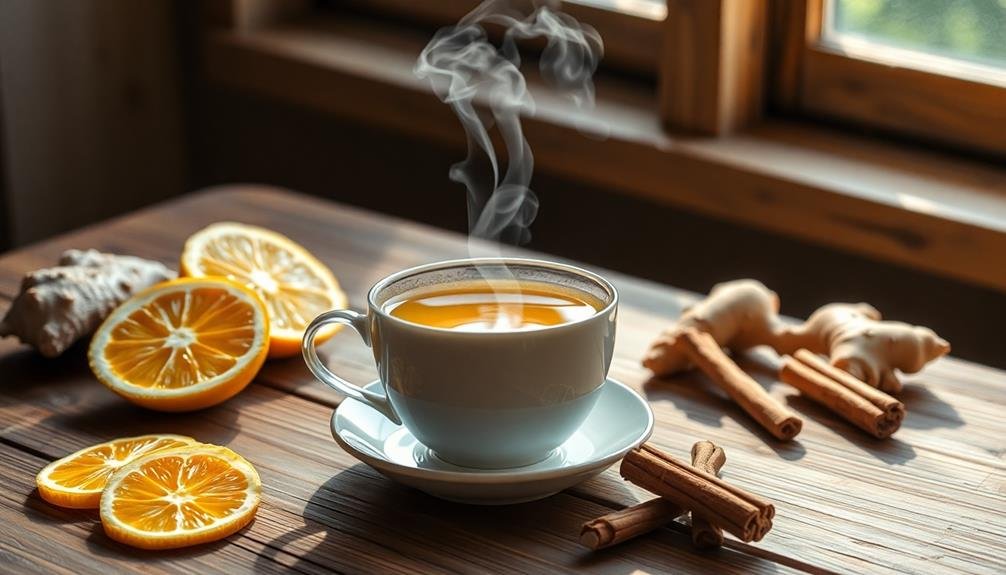
Vitamin C tea isn't just a delicious beverage; it's a powerhouse of health benefits. When you drink this nutrient-rich brew, you're giving your immune system a significant boost. Vitamin C is known for its ability to stimulate the production and function of white blood cells, which are essential for fighting off infections and diseases.
Regular consumption of vitamin C tea can help reduce the duration and severity of common colds. It's also an excellent source of antioxidants, which protect your cells from damage caused by free radicals. This protection may lower your risk of chronic diseases like heart disease and certain cancers.
You'll also enjoy improved skin health, as vitamin C supports collagen production, helping to maintain skin elasticity and reduce signs of aging. The tea can aid in iron absorption, making it particularly beneficial for those with iron deficiency anemia.
Additionally, it may help lower blood pressure and reduce the risk of cardiovascular disease. Drinking vitamin C tea can boost your energy levels, improve your mood, and enhance cognitive function.
It's a natural way to support your overall health and well-being, making it a valuable addition to your daily routine.
Ingredients for Immune-Boosting Blend
A potent immune-boosting tea blend starts with carefully selected ingredients. For this vitamin C-rich recipe, you'll need dried rosehips, hibiscus flowers, and orange peel as your base.
Rosehips are packed with vitamin C, while hibiscus adds a tart flavor and additional antioxidants. Orange peel contributes a zesty citrus note and extra vitamin C.
To enhance the blend's immune-boosting properties, include dried elderberries, known for their high vitamin C content and antiviral properties.
Add a pinch of dried ginger root to aid digestion and provide anti-inflammatory benefits. For a touch of sweetness and extra vitamin C, incorporate dried camu camu berries, one of the most concentrated natural sources of this crucial nutrient.
To round out the flavor profile, consider adding a small amount of dried lemon balm or lemon verbena. These herbs not only complement the citrus notes but also offer calming properties.
Finally, include a sprinkle of dried echinacea root, which may help stimulate the immune system.
Remember to source high-quality, organic ingredients whenever possible to guarantee the best flavor and maximum health benefits in your immune-boosting vitamin C tea blend.
Preparing Your Herbal Tea Mix
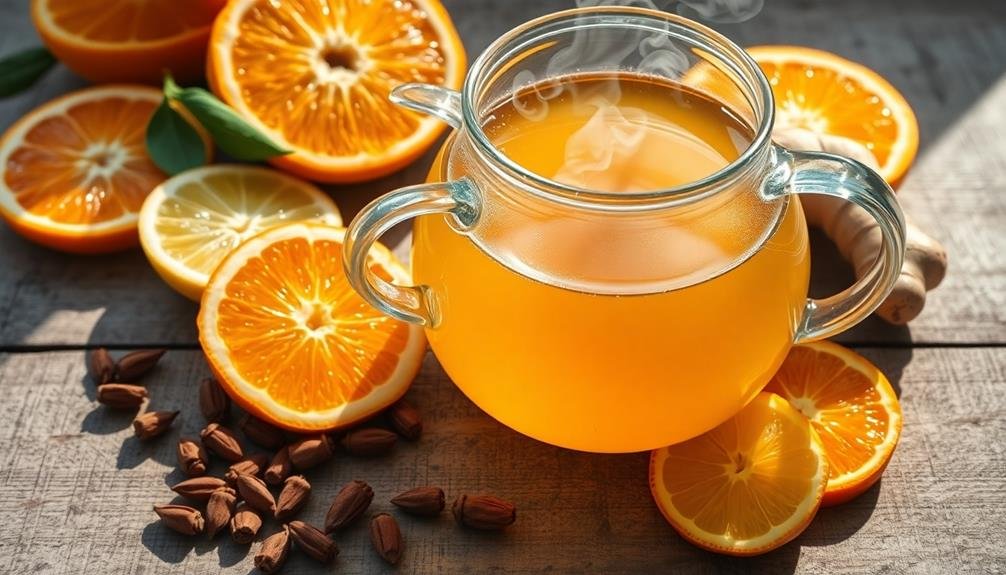
To create your immune-boosting tea blend, start by selecting herbs rich in vitamin C, such as rose hips, hibiscus, and lemon balm.
You'll want to measure out your chosen herbs carefully, typically using 1-2 teaspoons of each per cup of water.
Once measured, mix the dried herbs thoroughly in a bowl or container to guarantee an even distribution of flavors and nutrients in your final blend.
Selecting Vitamin C-Rich Herbs
Crafting a vitamin C-rich tea blend starts with choosing the right herbs. You'll want to focus on plants known for their high vitamin C content and immune-boosting properties. Rose hips are an excellent choice, containing up to 40 times more vitamin C than oranges. Hibiscus flowers are another potent source, offering a tart flavor and vibrant color to your blend.
Don't overlook common herbs like lemon balm and peppermint, which not only provide vitamin C but also add invigorating flavors. Elderberries and goji berries can contribute both vitamin C and antioxidants to your mix. For an extra boost, consider adding a small amount of camu camu powder, one of the richest natural sources of vitamin C.
Here's a quick reference guide for vitamin C content in common tea herbs:
| Herb | Vitamin C (mg/100g) | Flavor Profile |
|---|---|---|
| Rose Hips | 426 | Tart, fruity |
| Hibiscus | 14 | Sour, berry |
| Lemon Balm | 55 | Lemony, mild |
Remember to balance flavors and benefits when selecting your herbs. Aim for a combination that's both nutritious and delicious to guarantee you'll enjoy drinking your vitamin C tea blend regularly.
Measuring and Mixing Ingredients
With your herbs selected, it's time to measure and mix your vitamin C tea blend. Start by gathering a large mixing bowl, measuring spoons, and an airtight container for storage. You'll want to create a balanced blend that's both flavorful and nutritious.
Begin with a base of 2 tablespoons of rosehips, which are exceptionally high in vitamin C. Add 1 tablespoon each of hibiscus flowers and orange peel for additional vitamin C and a tart, citrusy flavor. Include 1 teaspoon of lemon balm leaves for a subtle lemon taste and calming properties.
Next, incorporate 1 teaspoon each of elderberries and chopped licorice root to boost immunity and add sweetness. For a spicy kick and anti-inflammatory benefits, add 1/2 teaspoon of ginger root. Finally, include 1/4 teaspoon of cinnamon bark for its warming qualities and to enhance the overall flavor profile.
Mix all ingredients thoroughly in the bowl, ensuring even distribution. Once combined, transfer the blend to your airtight container. Label it with the date and contents.
Store in a cool, dry place away from direct sunlight to preserve freshness and potency.
Brewing the Perfect Cup
The art of brewing the perfect cup of vitamin C tea begins with attention to detail. Start by heating fresh, filtered water to just below boiling point, around 195°F (90°C). This temperature helps preserve the delicate flavors and nutrients of your tea blend.
Place your measured tea mixture into a tea infuser or directly into your cup. Pour the hot water over the blend, ensuring all ingredients are fully submerged. Allow the tea to steep for 5-7 minutes, depending on your desired strength. During this time, cover your cup to trap the steam and volatile compounds.
After steeping, remove the infuser or strain the tea if you've brewed it loose. Give the tea a gentle stir to distribute the flavors evenly. If you prefer, add a small amount of honey or lemon juice to enhance the taste and boost vitamin C content further.
Let the tea cool for a few minutes before sipping. This not only prevents burning your tongue but also allows the flavors to develop fully.
Enjoy your immune-boosting vitamin C tea while it's still warm for maximum benefits and a comforting experience.
Customizing Your Tea Blend
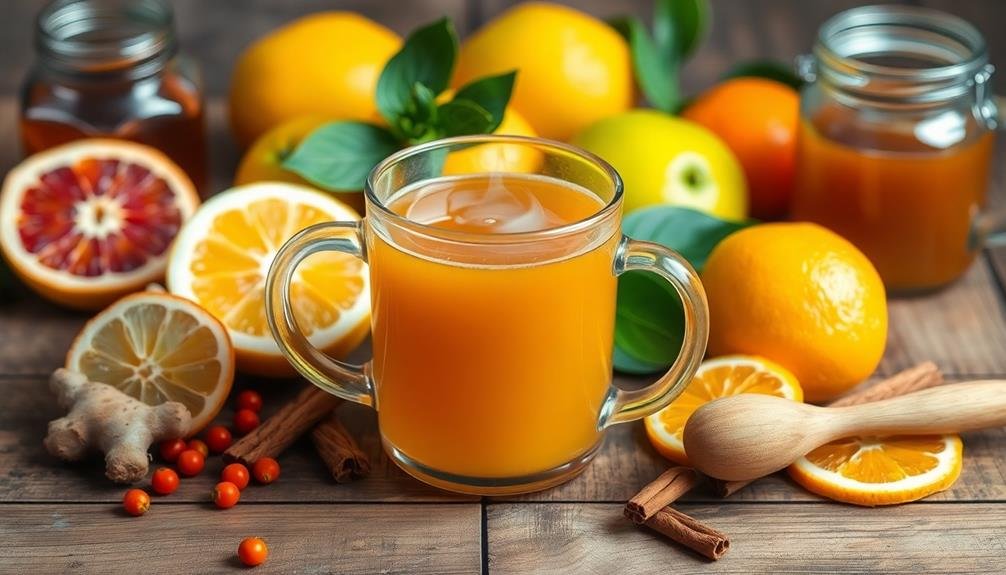
You can personalize your Vitamin C tea blend to suit your tastes and needs.
Try adding flavor enhancers like lemon zest or ginger to boost both taste and health benefits.
Don't hesitate to adjust the ratios of ingredients or incorporate additional herbs like mint or chamomile for a unique twist on your immune-boosting brew.
Add Flavor Enhancers
Three key flavor enhancers can transform your vitamin C tea blend into a personalized, delicious drink.
First, consider adding a touch of sweetness with honey or stevia. These natural sweeteners not only improve taste but also offer additional health benefits. Honey, in particular, has antimicrobial properties that complement the immune-boosting effects of vitamin C.
Next, incorporate citrus zest for a burst of aromatic flavor. Lemon, orange, or grapefruit zest can intensify the citrusy notes in your tea while providing extra vitamin C. Grate the outer peel carefully, avoiding the bitter white pith underneath.
Finally, don't overlook the power of spices. Cinnamon, ginger, and turmeric are excellent choices that add warmth and complexity to your blend. These spices also boast anti-inflammatory properties, further enhancing your tea's health benefits.
When adding flavor enhancers, remember to:
- Start with small amounts and adjust to taste
- Experiment with different combinations
- Consider the overall balance of flavors
Adjust Ingredient Ratios
Frequently, adjusting ingredient ratios is the key to creating a personalized vitamin C tea blend that suits your taste preferences and nutritional needs. Start by experimenting with the base ingredients, such as rosehips and hibiscus, to find your ideal balance. If you prefer a tangier flavor, increase the hibiscus content. For a sweeter taste, add more rosehips or include dried berries.
Don't forget to take into account the potency of your vitamin C sources. Adjust the amounts of citrus peels, camu camu powder, or acerola cherries to achieve your desired vitamin C intake. Remember that some ingredients, like camu camu, are highly concentrated, so a little goes a long way.
| Ingredient | Mild Blend | Strong Blend |
|---|---|---|
| Rosehips | 1 part | 2 parts |
| Hibiscus | 1 part | 2 parts |
| Camu Camu | 1/4 part | 1/2 part |
| Citrus Peel | 1/2 part | 1 part |
When adjusting ratios, keep track of your changes and note how they affect the flavor and potency of your tea. This will help you refine your blend over time. Don't be afraid to experiment with different combinations until you find your perfect vitamin C tea blend.
Incorporate Additional Herbs
To truly personalize your vitamin C tea blend, contemplate incorporating additional herbs that complement the base ingredients while adding unique flavors and potential health benefits.
Experiment with herbs known for their immune-boosting properties or those that enhance the overall taste profile of your tea. You might want to try adding echinacea, known for its potential to support immune function, or elderberry, which is rich in antioxidants.
Ginger can provide a warming, spicy kick while also offering anti-inflammatory properties. Don't hesitate to mix and match different herbs to create a unique blend that suits your taste preferences and health goals.
When incorporating new herbs, start with small amounts and adjust to your liking. Remember that some herbs may have strong flavors or potential interactions with medications, so it's always wise to research or consult with a healthcare professional before making significant changes to your tea blend.
Here are three popular herbs to contemplate adding to your vitamin C tea blend:
- Lemon balm: Adds a subtle citrusy flavor and may help reduce stress
- Tulsi (Holy Basil): Offers a slightly spicy taste and adaptogenic properties
- Rosehips: Enhances vitamin C content and provides a tart, fruity flavor
Storage and Shelf Life
Proper storage of your vitamin C tea blend is essential for maintaining its potency and flavor. Keep your blend in an airtight container, away from direct sunlight, heat, and moisture. A dark, cool pantry or cupboard is ideal. Glass jars or opaque, food-grade containers work best, as they protect the herbs from light exposure.
Label your container with the blend's ingredients and the date you made it. This will help you track freshness and avoid confusion with other tea blends. For best flavor and potency, use your vitamin C tea blend within 6 months. After this time, the herbs may lose their potency and flavor, though they're still safe to consume.
If you've added any fresh ingredients like citrus zest, consume the blend within 1-2 weeks and store it in the refrigerator. Dried herbs and flowers will last longer.
To extend shelf life, you can vacuum seal portions of your blend or store them in the freezer for up to a year. When you're ready to use frozen tea, let it thaw at room temperature before brewing to preserve its flavor profile.
Frequently Asked Questions
Can Pregnant Women Safely Drink This Immune-Boosting Vitamin C Tea Blend?
You should consult your doctor before drinking any new herbal tea while pregnant. While vitamin C is generally safe, some ingredients in immune-boosting blends might not be suitable for expectant mothers. It's best to err on the side of caution.
How Often Should I Consume This Tea for Optimal Immune Support?
For ideal immune support, you should aim to drink this tea daily. It's best to consume it in the morning or early afternoon. Don't overdo it, though. One to two cups a day is usually sufficient.
Are There Any Potential Side Effects of Drinking This Tea Regularly?
You shouldn't experience major side effects from drinking this tea regularly. However, you might notice increased urination due to its diuretic properties. If you're sensitive to caffeine, you could experience jitters or sleep disturbances.
Can Children Drink This Immune-Boosting Vitamin C Tea Blend?
You can offer this tea to children, but it's best to consult their pediatrician first. Reduce the honey for young kids and avoid it for infants. Adjust the strength to suit their taste preferences.
Is This Tea Blend Effective for Treating Colds and Flu?
You'll find this tea blend can help support your immune system during colds and flu. While it's not a cure, it may ease symptoms and boost your body's defenses. Remember, it's best used alongside proper rest and hydration.
In Summary
You've now got all the tools to create your own immune-boosting vitamin C tea blend. Don't be afraid to experiment with different ingredients and ratios to find your perfect mix. Remember to store your blend properly to maintain its potency. By incorporating this tea into your daily routine, you'll be giving your immune system a natural boost. So go ahead, brew a cup, and sip your way to better health!

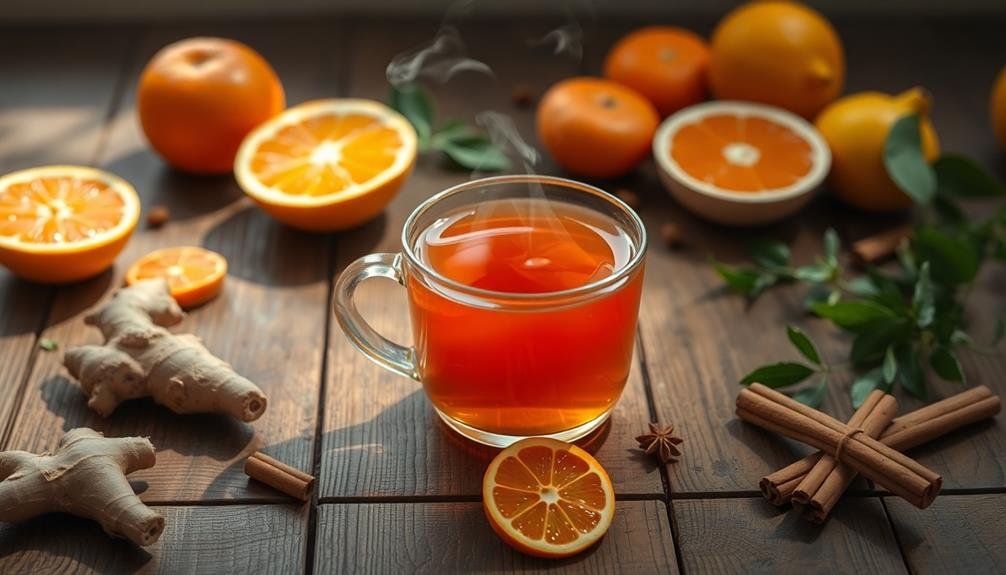


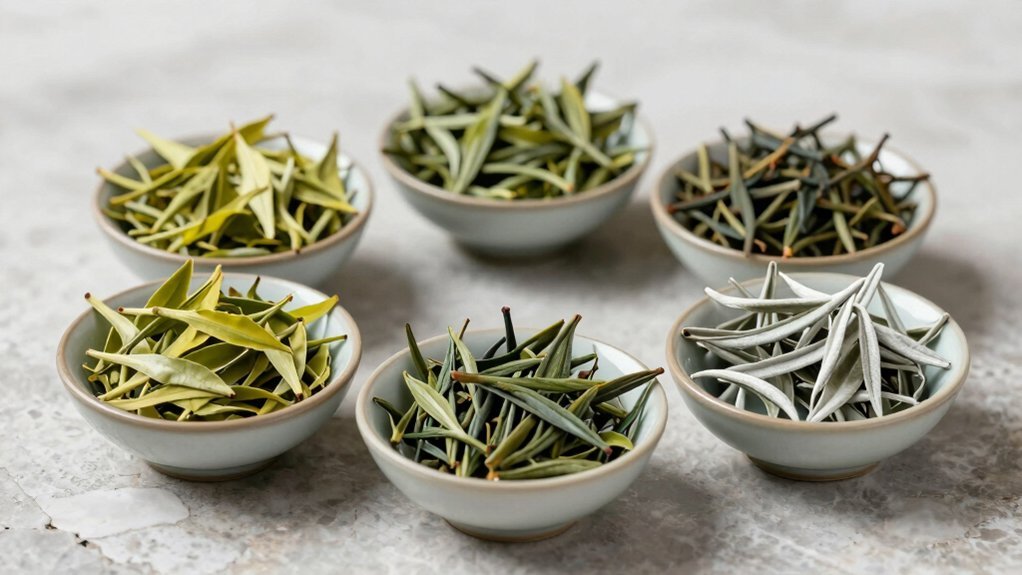
Leave a Reply